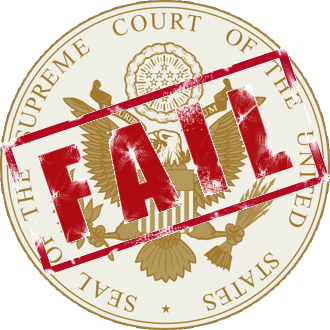Art credit: Tenthamendmentcenter.com
So the SCOTUS
validates Obamacare in a 6-3 vote, leaving the Ohio Health Care Compact (HB 34) as the best available protection for Ohioans; see CTPP’s earlier blog here and scroll to the bottom for
details on Columbus lawmakers.
William A. Jacobson
at Legal Insurrection has posted much of Justice Antonin Scalia’s dissent. Here are
some key passages:
"Scalia points out that the words have a plain meaning:
This case requires us to
decide whether someone who buys insurance on an Exchange established by the
Secretary gets tax credits. You would think the answer would be obvious—so
obvious there would hardly be a need for the Supreme Court to hear a case about
it. In order to receive any money under §36B, an individual must enroll in an
insurance plan through an “Exchange established by the State.” The Secretary of
Health and Human Services is not a State. So an Exchange established by the
Secretary is not an Exchange established by the State—which means people who
buy health insurance through such an Exchange get no money under §36B.
Words no longer have
meaning if an Exchange that is not established by a State is
“established by the State.” …. [at 2, italics in original]
"Scalia argued — persuasively — that the overriding goal seems to
be saving Obamacare, not exercising normal judicial interpretation of plain
language:
“[T]he plain, obvious,
and rational meaning of a statute is always to be preferred to any curious,
narrow, hidden sense that nothing but the exigency of a hard case and the
ingenuity and study of an acute and powerful intellect would discover.” Lynch
v. Alworth-Stephens Co., 267 U. S. 364, 370 (1925) (internal quotation marks
omitted). Under all the usual rules of interpretation, in short, the Government
should lose this case. But normal rules of interpretation seem always to yield
to the overriding principle of the present Court: The Affordable Care Act must
be saved. [at 2-3]
"Scalia wrote that the majority opinion rewrote the law “with no
semblance of shame”:
The Court interprets §36B
to award tax credits on both federal and state Exchanges. It accepts that the
“most natural sense” of the phrase “Exchange established by the State” is an
Exchange established by a State. Ante, at 11. (Understatement, thy name is an
opinion on the Affordable Care Act!) Yet the opinion continues, with no
semblance of shame, that “it is also possible that the phrase refers to all
Exchanges—both State and Federal.” Ante, at 13. (Impossible possibility, thy
name is an opinion on the Affordable Care Act!) [at 3]
"Scalia then delivered the best line of the day. Looking back
over multiple decisions from the Court to rewrite Obamacare in order to save
it, Scalia insisted that the law now should be called SCOTUScare:
Today’s opinion changes
the usual rules of statutory interpretation for the sake of the Affordable Care
Act. That, alas, is not a novelty. In National Federation of Independent
Business v. Sebelius, 567 U. S. ___, this Court revised major components of the
statute in order to save them from unconstitutionality. The Act that Congress
passed provides that every individual “shall” maintain insurance or else pay a
“penalty.” 26 U. S. C. §5000A. This Court, however, saw that the Commerce
Clause does not authorize a federal mandate to buy health insurance. So it
rewrote the mandate-cum-penalty as a tax. 567 U. S., at ___–___ (principal
opinion) (slip op., at 15–45).
The Act that Congress
passed also requires every State to accept an expansion of its Medicaid
program, or else risk losing all Medicaid funding. 42 U. S. C. §1396c. This
Court, however, saw that the Spending Clause does not authorize this coercive
condition. So it rewrote the law to withhold only the incremental funds
associated with the Medicaid expansion. 567 U. S., at ___–___ (principal
opinion) (slip op., at 45–58). Having transformed two major parts of the law,
the Court today has turned its attention to a third. The Act that Congress
passed makes tax credits available only on an “Exchange established by the
State.” This Court, however, concludes that this limitation would prevent the
rest of the Act from working as well as hoped. So it rewrites the law to make
tax credits available everywhere.
We should start calling
this law SCOTUScare. [at 20-21, emphasis
and hard paragraph breaks added.]
"The legacy of this Court, Scalia wrote, will live on just as
Obamacare, but in infamy:
Perhaps the Patient
Protection and Affordable Care Act will attain the enduring status of the
Social Security Act or the Taft-Hartley Act; perhaps not. But this Court’s two
decisions on the Act will surely be remembered through the years. The
somersaults of statutory interpretation they have performed (“penalty” means
tax, “further [Medicaid] payments to the State” means only
incremental Medicaid payments to the State, “established by the State”
means not established by the State) will be cited by litigants endlessly, to
the confusion of honest jurisprudence. And the cases will publish forever the
discouraging truth that the Supreme Court of the United States favors some laws
over others, and is prepared to do whatever it takes to uphold and assist its
favorites.
I dissent.
Call or email
representatives in Columbus (scroll down here).
# # #








No comments:
Post a Comment
Thanks For Commenting